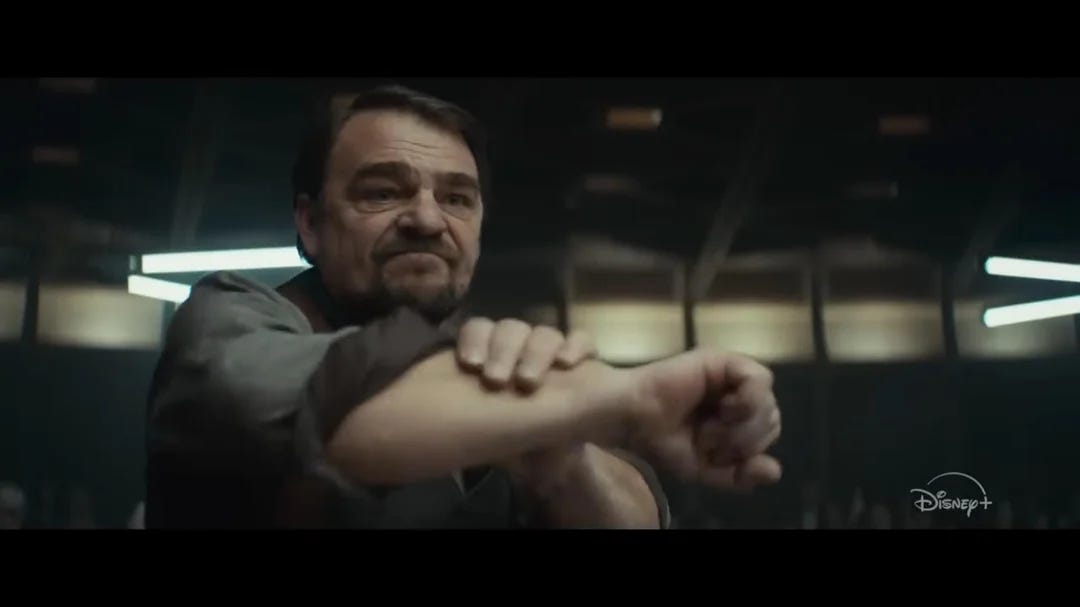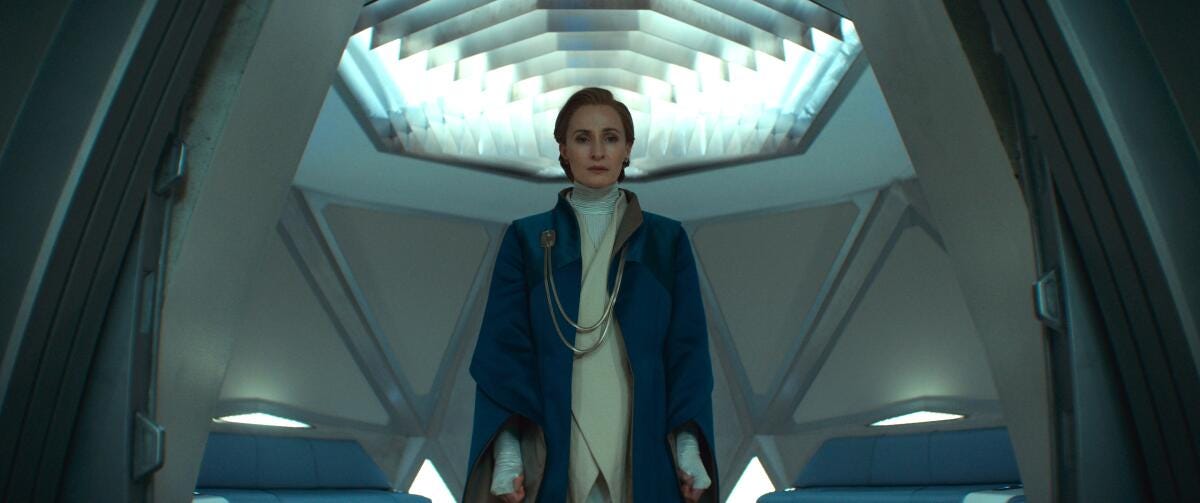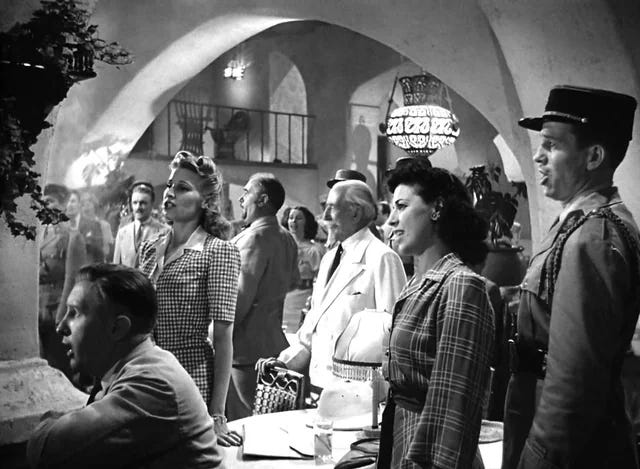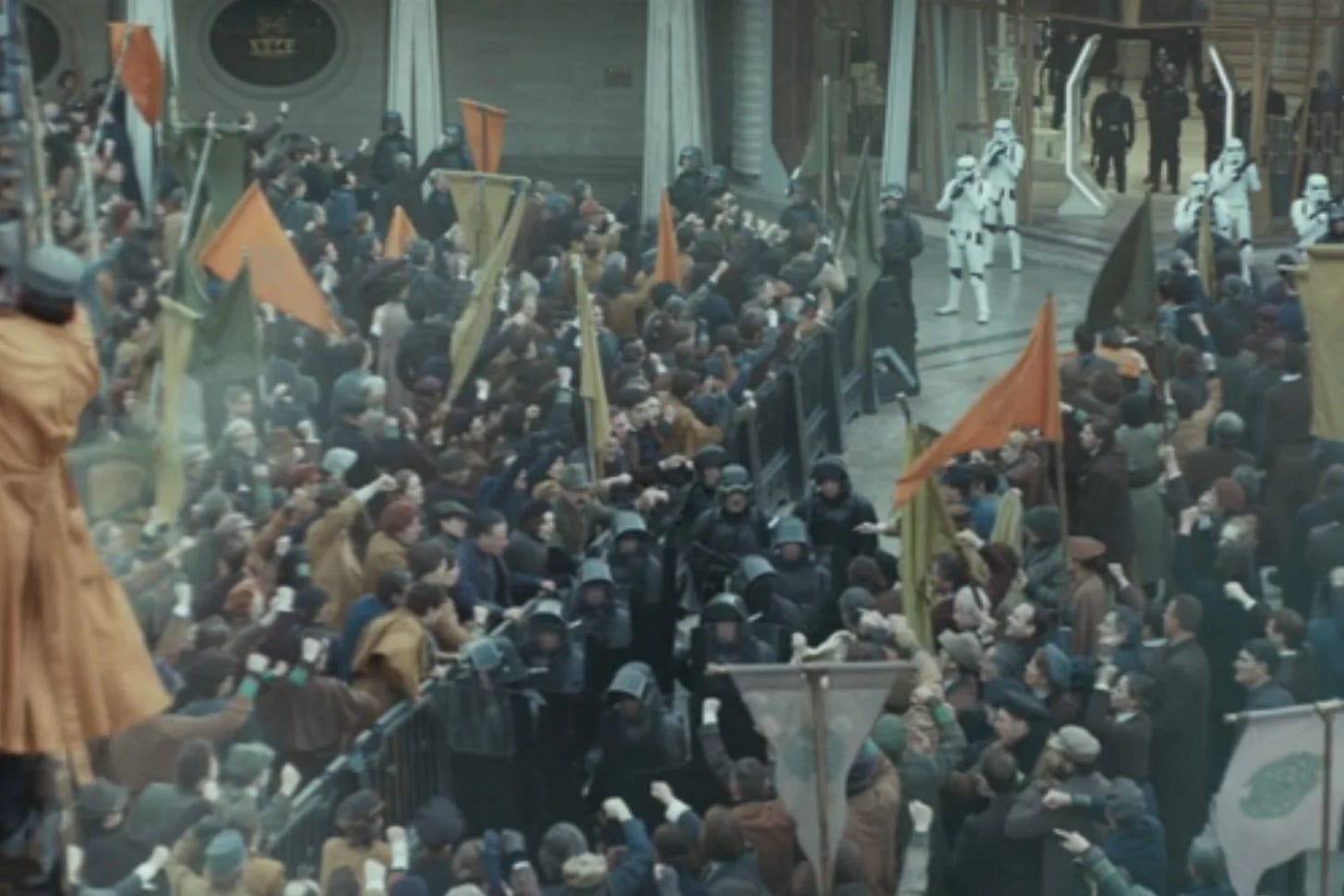EDIT: I am general anti-spoiler warnings unless the topic being discussed is not something that is clearly inevitable in a story—I prefer the journey to the destination. However, to be extra nice, I would like to warn anyone that might disagree with that principle that this article does contain spoilers for Andor Season 2. Also, Darth Vader is Luke’s father, and Tyler Durden was the guy all along.
I am not embarrassed to say that the most recent three episodes of Andor have left me in a near-catatonic state. I am writing this more for myself than anything because I have become entirely useless until I can get my thoughts written out about the masterpiece of television that I watched yesterday.
For anyone reading this that does not know me personally, I have been driving literally everyone I know completely mad trying to get them to watch this show. Over its two seasons, Andor is lightning in a bottle—a miracle of television as an artistic medium that will likely never be seen again. For the record, I am a huge Star Wars fan, but my long-held obsession with the series and its universe has waned as I have gotten older. I still enjoy watching many of the films and still follow the series fairly closely, but it has not had a hold on me like it did when I was a child. I was under the impression that I could spend the rest of my life appreciating the quality reached by the best parts of the series and I had come to terms with nothing being able to capture the unadulterated wonder it gave me when I was a child. I was right and wrong about this at the same time, because Andor captures me in a completely different way, a way that no other story ever has in my life. It is a more distilled feeling of terrible, miserable joy mixed with every other emotion banging around my head at once in the same way that only the greatest art can. It is because of this that I can say my obsession with this show does not stem from my love of the universe it inhabits, but because it is genuinely, absolutely, a masterpiece. Not just relative to the quality the series usually has, but relative to any other show I have seen in my life. I have thrown away my biases as best I can in my assessment, yet all that has managed to do is elevate Andor even higher as a triumph of creative achievement.
I have loved Star Wars ever since I saw an episode of the Clone Wars CGI cartoon when I was six years old. Since then my journey with the IP has been just as fraught as many others, especially as I grew up and my creative understanding matured. I became disappointed with most of the content being released—it felt as if the first piece of art I had grown to appreciate had been transformed into an insufferable barrage of content with zero thought or emotion put into it other than basically jangling cameos in front of the audience like car keys to a toddler. But all this time I have never lost my love for the universe itself. Not even necessarily because of its quality or its interest, but the sheer depth of it is unmatched by anything else in our culture.
The Star Wars universe does not exist, but is so old and so constantly present that it has taken a life of its own. It is a fiction with its own history that has developed and expanded over half a century, an aesthetic so consistent, so fleshed out right from the beginning that any piece of Star Wars media can exist within an entirely metatextual space, where the themes have salience only as relevance to other Star Wars media. This is usually a detriment—the constant appearances of “Glup Shittos” as they are referred to by frustrated fans are a symptom of this—but when harnessed properly it is incredible. There is so much information and so much to pull from that its world can exist completely within itself, and yet at the same time can tell stories about our own society just as viscerally and incisively as any fiction set in the real world. All of the foundation has been set to such an extent that there is history and even historiography surrounding this fictional universe, both of which can be pulled from to create a total lived-in feeling of unmatched immersion. Every offhand reference to a planet or battle or event or species is backed up by 50 years of thousands of books telling stories running thousands of years of fictional science-fantasy history. Nothing else on this planet even comes close—it is more apt to compare an expert in Star Wars lore to that of a student of Catholicism or a country’s history than it is to another IP.
The only piece missing here to truly reach the potential this world has created, at least until the release of Andor, is for someone to take these fun, pulpy stories of adventure and danger, of heroes and good and evil and the spiritual nature of The Force, and treat it as if that world is actually, genuinely, real. Tony Gilroy has done that in such a way that should be impossible. He shows the true, exact, terrible cost of revolution both in body count and in psyche. The original three movies, and to a clumsier extent the prequel trilogy as well, skim the surface of this but never have the sheer nerve it takes to fully dive to the bottom. Andor by contrast jumps in and swims directly to the lakebed. It shows the silt and scum and muck that gets under one’s fingernails while they choke from the foggy water and sand fills up in the nostrils and mouth. And it does so in ways that should be impossible for the series that begins with a farmer using magical powers to blow up a planet-destroying battlestation. With the most recent three episodes of Andor, Star Wars reaches its crescendo in such an emotionally resonant way that words cannot adequately describe its effect. It is more a manifesto of revolution than a piece of science-fantasy media, portraying every single facet of its dystopia with brutal, horrific, beautiful honesty. It never lingers on the suffering of its characters longer than it needs to, never debases itself with melodrama or sloppily-done torture porn. Everything is done with complete confidence and faith in every part of the immense craft required to build a massive-budget television project, and it sticks the landing every single time it is required to do so, no matter how difficult it is to reach.
As an example, here is my attempt to transcribe the lyrics of the Ghorman Anthem, a song of protest sang by thousands of people from a doomed culture that from the very beginning we know have no avenue to survive the onslaught of the show’s events. From the first episode, the people of Ghorman are manipulated, stomped on, and slowly but surely ruined by the Empire in such a way that it is impossible not to draw parallels to our current society. When they finally take to the streets, we know exactly what will happen. The beautifully-developed, rich and tactile culture has been thoroughly created over eight hours of television until the climax, where they break into defiant song in a constructed language where anyone who has read or seen Les Miserablés will be reminded of the moment at the barricade just before the boot finally comes down. The transcription is imperfect—I cannot speak Ghor, obviously, and the language uses French pronunciation which I am horrific at with my very limited understanding of French already, but I have done my best:
On dou mae veraa vesajhe / domahl dou Ghor…
Kahs dou floh un kash veroh / domahl dou Ghor…
Vallen! nezhka! / di mon-rye mou nye solezhna!
Beh-de fian un fohl carrohn / domahl dou Ghor…
Vein-kie won un tehs-minaa / domahl dou Ghor…
Vallen! nezhka! / di mon-rye mou nye solezhna!
A de-gah she-fiahn prezhkash / gavohl dou Ghor…
Navinie ne Palmo-sied / gavohln dou Ghor…
Vallen! nezhka! / di mon-rye mou nye solezhna!
Vlah-die Ghorn di fae carrohn / domahl dou Ghor…
Navinie ne Palmo-sied / gavohln dou Ghor…
Vallen! nezhka! / di mon-rye mou nye solezhna!
Beh-de fian un fohl carrohn! / domahl dou Ghor!
This episode only came out yesterday so this is the only clip I could find of the song itself—keep in mind the tension rises as the lyrics repeat for several minutes until everything really goes to hell.
Though it is effectively gibberish (though they did create an actual functional Ghor language for the show), the decades of creating every single piece of the universe that this culture inhabits means watching their final stand against impending doom is exactly as affecting as watching a depiction of something like the Warsaw Uprising. It does not feel like watching Luke and Han and Leia aboard the Millennium Falcon. it is more like watching the bar in Casablanca join in a chorus of La Marseillaise in defiance of the Nazis, who have driven the patrons from their homelands.
And then, these people, who know their planet is about to be strip-mined so thoroughly that the soil will be forever salted and the planet will be rendered uninhabitable, are massacred. They are killed en masse in the streets with no mercy or quarter given—the same series that gave us Jar Jar Binks and guerilla teddy bears shows a 20 minute uninterrupted sequence of death and murder that spells the final cry of pain of an entire people. The stormtroopers who usually bump their heads on ceilings and seem to always miss point-blank shots at our heroes corral the protestors into a killzone and snipers pick off fleeing civilians and us viewers watch through their scopes while they take the shots. The Empire’s plan goes off without a hitch and all the protagonists can do is watch it happen until they find a chance to get out.
Eventually, everyone in the square lies dead, but the murder does not stop. They move into the streets and continue to massacre anyone they see, the show refuses to let any moment breathe at all, ending on a shot of the title character’s face in tears as he drives away from the carnage, an emergency broadcast of one of the few survivng Ghormans pleading for anyone to listen as the entire planet is murdered without even knowing why. They are no longer even asking for anyone to save them—it is too late to be saved, they know Ghorman is well and truly doomed. They just need the galaxy to know what actually happened to them before the Empire corrupts the narrative of the genocide into somehow being their own fault.

I now run into a very strange problem. I want to write something that encapsulates every individual piece of what makes this show exceptional—but all of this that I have just said only touches upon about 30 percent of what is even going on in this scene, and the entire show matches this level of depth and terrible reality from basically the first few episodes. I have yet to even mention the episode following this—which transforms the show into a slick and dramatic political thriller to extract a rebellious senator from the Imperial capitol after she makes an incrediby poignant and salient speech denouncing the Empire and declaring open rebellion. I have not mentioned the strange and offputting fascist incel weirdo that falls in love with the woman in charge of destroying Ghorman, who is manipulated into causing this failed revolt under the auspices of finding rebel agitators. His story comes to a climax here as well in just as horrific a way, simultaneously with the carnage surrounding him on all sides that he unwittingly created. I have barely even referenced the titular character of the show, because all he can be in this episode is a witness to the horror and misery. Yet I have already written so much, and delving into any other facet of this masterpiece of a show deserves its own article. I was originally resolved to wait until the entire season had been released—it was only planned for two seasons, and it leads directly into the film Rogue One—but I genuinely was unable to focus on anything after witnessing this episode.
It is an overwhelming concept to me, putting all the thoughts on this show that I have worth reading onto the page. Andor, somehow, just continues to astound me as it goes on. The episode immediately following this one is a masterpiece as well for entirely different reasons, and is no less portentious of the direction our world is heading. Going from a tragedy like the Ghorman Massacre to a tight and stressful spy thriller should be impossible, but the show pulls it off with perfect grace—no clumsy adjustment period, no tonal whiplash. In the most incredible fashion, one is suddenly reminded that the showrunner, Tony Gilroy, made the Jason Bourne movies.
I will write another article about that one eventually, but for now I would like to leave you with a couple lines from Senator Mon Mothma’s speech:
“Of all the things at risk, the loss of an objective reality is perhaps the most dangerous. The death of truth is the ultimate victory of evil. When truth leaves us, when we let it slip away, when it is ripped from our hands, we become vulnerable to the appetite of whatever monster screams the loudest!”
I’m not sure, but I think this show might be trying to tell us something…

Thank you to anyone who made it this far! I’ve got a couple more novel-related articles in the works that I have ignored in order to put this out, so keep on the lookout for those. Bye for now!
P.S. - apologies to anyone that actually knows how to transcribe language because the lyrics of the Ghorman Anthem compared to the video clip can tell that I am horrific at it.






Thanks for the spoiler alert. Andor is on our family watch list so I’ll have to come back to this later.